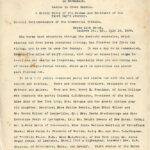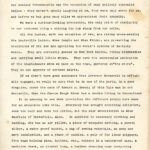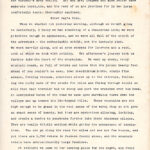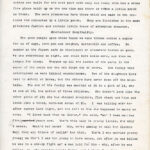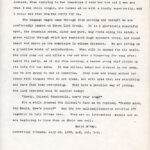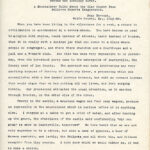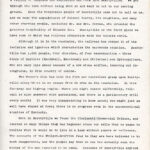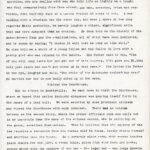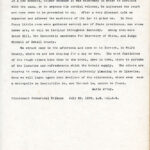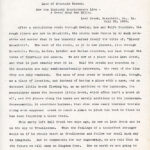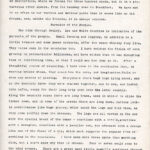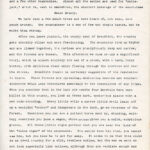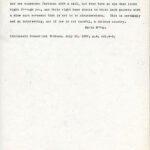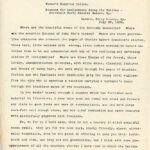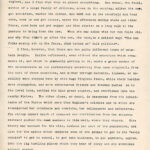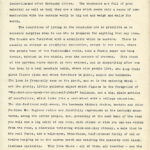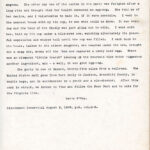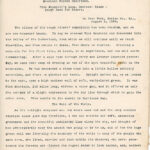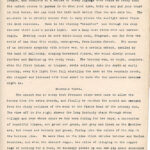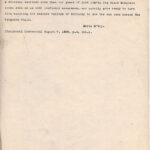Pine Mountain Settlement School
Series 01: HISTORIES
“A Novel Excursion”
by Maria McVay
1899
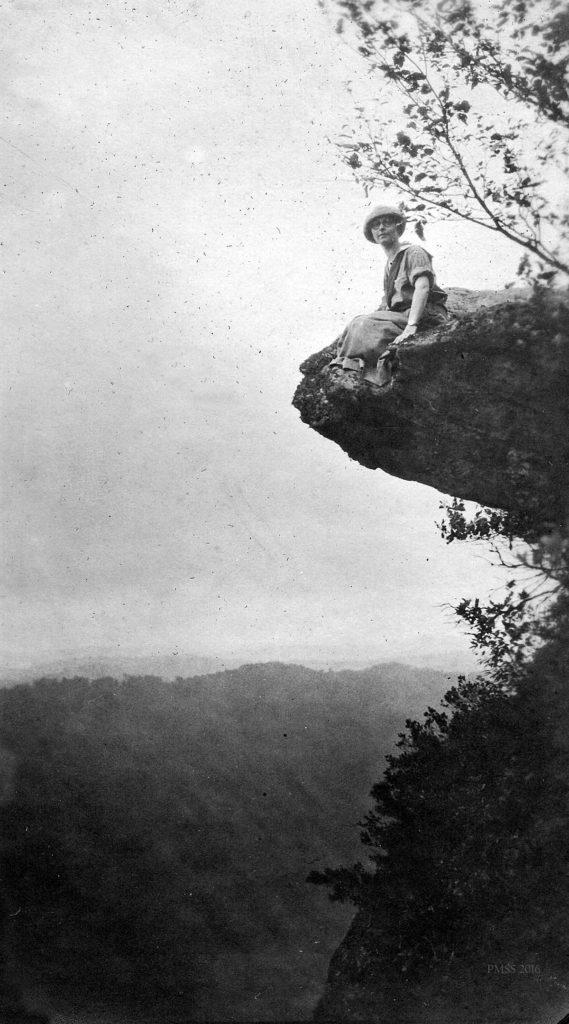
Jack’s Gap on Pine Mountain, KY. (with Katherine True ?) [true_076_mod.jpg]
TAGS: Pine Mountain Settlement School history, Maria McVay, Berea College excursion by horseback, Kentucky mountains, Harlan County, Letcher County, Cumberland River, Big Black Mountain, horses, camping, Katherine Pettit, Madeline McDowell Breckenridge, Desha Breckenridge, Rev. Henry Mixter Penniman, Colonel C.E. Sprague, Mrs. Sprague and daughter Beatrice, Nellie Semple [Ellen Churchill Semple], Ethel Wilder, Edwin Wilder, Dwight Bowers, Edward A Bowers [?], B. Wood Davis, Julia Wallace, Julia J. Freeborn, Mr. and Mrs. F.H. Chapman, Miss M.G. Potter [N.Y. lawyer], Jesse Frank James, Rev. G.W. Stearns, Jackson County
HISTORIES PMSS 1899 A Novel Excursion by Maria McVay
Katherine Pettit’s Journey with a Berea College Group into Harlan County
in 1899 as Recorded by Maria McVay
Maria McVay wrote this travelogue for a newspaper. Very little is known about Maria as a person or an author. Her account, however, provides a wealth of information about Katherine Pettit’s first recorded journey into Harlan County, Kentucky. Further, McVay’s account provides a counter-point to the similar and more famous accounts that grew out of the experience. Other famous scribblers were on the journey with McVay. For example, the internationally known geographer, Ellen Churchill Semple. It is not known if Katherine knew either McVay or Semple before the excursion. Yet, it is clear they shared common interests and the three women, in their own way helped helped to re-shaped the field of geography, history, anthropology, and ultimately yielded a new area of scholarship, that of “anthropogeography” and its classroom — Eastern Kentucky.
The newspaper for which Maria McVay wrote the travelogue, was the Cincinnati Commercial Tribune. It was a major daily newspaper in Cincinnati, Ohio that began in 1896. It had a short life as it was purchased and changed its title in 1911 but continued to have an erratic existence. Luckily, McVay’s account survived and was collected in one of the Settlement School’s scrapbooks.
” A Novel Excursion” by Maria McVay is important to the history of Pine Mountain Settlement School and to the early history of Harlan County. The “Excursion” is one of the earliest accounts of Katherine Pettit in the far reaches of Kentucky. It is the first account of her lasting fascination with that unique corner of Kentucky and laid the groundwork for Pettit’s very early and formative journeys into Harlan County to create the Pine Mountain Settlement School. Katherine Pettit’s traveling companions were all major influencers on Pettit’s interest in Harlan County and its potential as another site for a mountain settlement school. The new school would be slow to evolve but in 1913, it became an addition to the earlier school Pettit and May Stone had created at Hindman in Knott County, KY — the W.C.T.U Settlement, later known as Hindman Settlement School.
Hindman and Pine Mountain Settlement School were two of the earliest rural settlement schools in Kentucky, and Katherine Pettit envisioned both schools. The two schools, Hindman and Pine Mountain, owe their formation to Pettit’s extensive and deep first-hand knowledge of the eastern Kentucky geography and its people. This journey, recorded by the budding writer, Maria McVay, was a formative journey for Katherine Pettit, Maria McVay and their ecclectic traveling companions. While there were many later trips taken by Pettit deep into the remote areas of Eastern Kentucky, this trip and her companions clearly made this a formative experience in the adventurous and complex life of Katherine Pettit and her fellow travelers. In the early twentieth century, Pettit was not alone in seeking to know more about deep Appalachia and to understand the land, the resources, and the people of Eastern Kentucky.
A NOVEL EXCURSION: Madeline McDowell Breckinridge
THE TRAVELERS
On this important trip, in addition to McVay, another of Pettit’s traveling companions was Madeline McDowell Breckinridge, wife of Desha Breckinridge, editor and publisher of the Lexington Herald from 1897 to 1935. Breckinridge had supported the founding of a “social settlement at Proctor, Kentucky’s Episcopal mission with the Gleaners of Christ Church Episcopal from 1899 to 1900.” Proctor is in Lee County, Kentucky, near Beattyville, which became a stop in this group’s journey. Proctor, like the growing number of the rural Settlement Movement “spin-offs”, was modeled on Hull House, founded by Jane Addams in urban Chicago. Like both the urban and the rural iterations of the American Settlement Movement, the Appalachian programs were focused on child welfare, health, and women’s rights, and many in the group had a close interest in the work Jane Addams had initiated in Chicago.
But — Eastern Kentucky at the end of the nineteenth century was not Chicago by any stretch of the imagination. Madeline McDowell Breckinridge was a close friend of Jane Addams, the founder of Hull House in Chicago; the foundational institution for the urban Settlement Movement across America. Madeline Breckinridge was also important to the success of the large Eastern Kentucky ensemble. Her journey, and her presence were an endorsement of the evolving mountain settlement movement. Breckinridge, a leader in the women’s suffrage movement of Kentucky, became known as one of the most important suffragettes in the country and, as a friend of Jane Addams, the founder of the national Settlement Movement, the two were a force for change in rural health, women’s rights, and political power.
She had just married the Lexington Herald writer, Desha Breckinridge in 1898, and found in him a strong supporter of her suffragist activities. Her deep interest in working to improve health and education in the state of Kentucky included a focused commitment to t,e needs of the eastern mountain region of the state. Her own struggle with tuberculosis had left her partially disabled but her disabilities did not prevent her from making many trips into the mountains in support of Pettit and others who pursued permanent schools and medical settlements in the mountains of Eastern Kentucky. Her strong support was instrumental in the success of the founding of Hindman Settlement School, and, with the new adventure. promised to be a strong support to Pettit as she explored new prospects deeper into Harlan County.
A NOVEL EXCURSION: Ellen Churchill Semple
Another traveler of consequence with the group was Ellen Churchill Semple (January 8, 1863 – May 8, 1932), called “Nellie” in this travel account, she was a pioneer and trailblazer in the field of geography, particularly human geography. A Vasser graduate, Semple was the first female president of the Association of American Geographers and her vita is a long and amazing one. Her important contribution to the creation of geography departments across the country, began in the groundbreaking and controversial article, The Anglo-Saxons of the Kentucky Mountains, 1901, which is based on Semple’s mountain journey with McVay, Pettit, and the others on this important “excursion.”

Ellen Churchill Semple. [Ellen-Churchill-Semple.jpg] Source: http://kdl.kyvl.org/catalog/xt74j09w2533_2_1
A NOVEL EXCURSION: Comparison of Reports by McKay and Semple
The following serialized news report by McVay stands in contrast to the scholarly work of Ellen Churchill Semple. The young Maria McVay describes the journey in very personal terms as it followed the organized itinerary in July 1899. Led by Rev. Henry M. Penniman of Berea College, the group of nineteen travelers and their drivers and guides was large but the young Miss McVay, one of the youngest of the group, had a sharp eye and ear and she noted that the nineteen individuals represented eight states and was held together by the shared sentiment that all of those present “are in love with Kentucky.”
Miss McVay’s “A NOVEL EXCURSION” was published as a running account of the trip in the Cincinnati Commercial Tribune with the first publication on July 18, 1899, and the last on August 7, 1899.
The complexity of this “excursion” comes through when compared to the account by Ellen Churchill Semple. In her account, written in 1901 and based on her observations and her research notes from “A Novel Excursion,” a more academic and controversial response may be found. Reading the people and landscapes of Eastern Kentucky is complex and the lighthearted account of McVay stands in contrast to the later ethnographic account of the journey written by Semple, whose writing about Appalachia has raised serious controversy. Other complex observations may possibly be found in the writing of some of the other travelers and will be published on this site if located. It is likely they would provide even more depth and variety regarding this amazing “excursion.”
TRANSCRIPTION (OCR): HISTORIES 1899 A Novel Excursion by Maria McVay
(Slightly edited for clarity.)
[1.001-1.005]
A NOVEL EXCURSION.
Gay Party Starts on a Trip Through Kentucky Mountains on Horseback.
Ladies in Cross Saddle.
A Breezy Story of the Scenes and Incidents of the First Day’s Journey.
Special Correspondence of the [Cincinnati] Commercial Tribune.
[1.001]
Horse Lick Creek,
Jackson Co., Ky, July 16, 1899
The horseback excursion through the Kentucky mountains, which started out from Berea yesterday morning, has finished its first day riding, [and] is now in camp for Sunday. It was a day to be remembered. Twenty-five miles of stiff riding, with only occasional stops to rest can not easily be forgotten, especially when you are riding one of those single-footed horses, whose gait is mysterious and past finding out.
It is a very jolly, congenial party and starts out with the best of health and spirits. There are nineteen travelers, exclusive of the drivers and guides. They are Rev. Henry M. Penniman, of Berea College who conducts the party; Colonel C.E. Sprague, President of the Union Dime Bank of New York City; Mrs. Sprague and her pretty sixteen-year-old daughter Beatrice; Miss Nellie Semple [geographer]; Miss Ethel Wilder and Mr. Edwin Wilder of Louisville, Ky.; Mrs. Desha Breckenridge and Katherine Pettit of Lexington, Ky.; Mr. Dwight Bowers of New Haven, Conn.; Mr. B. Wood Davis of Cincinnati; Miss Julia Wallace Redfield of Pittsfield, Mass.; Julia J. Freeborn of Warren, R.I.; Mr. and Mrs. F.H. Chapman, of Franklin Falls, N.H.; Miss M.G. Potter, of New York City; Mr. Jesse Frank James, of Lawrence, Mass. (not a highwayman, however); Rev. G. W. Stearns, of Middlesboro, Mass., and myself.
Eight states of the Union are represented in a party of nineteen and all the representatives are in love with Kentucky.
[1.002]
-2-
AN ATTRACTIVE CAVALCADE.
As the cavalcade moved out of Berea it was like a circus parade to the inhabitants of the town. Everyone lined up to see us start, and our amateur horsemanship was the occasion of many politely concealed smiles — they weren’t openly laughing at us, they were only sorry for us, and before we had gone many miles we appreciated their sympathy.
We were a curious-looking procession, the only point of similarity in our costumes being a shining tin cup slung from our belts.
All the ladies, with one exception of two, are riding cross-saddle; the Louisville ladies, Miss Semple and Miss Wilder, are preserving the traditions of the sex and upholding the world’s opinion of Kentucky women. They are correctly gowned in New York habits, riding sidesaddles and carrying swell little whips. They have the unconcealed admiration of the mountaineers whom we pass on the road, gathered at “the store.” They do not approve of dvided skirts.
If we didn’t have good assurance that Governor Roosevelt is officially engaged, we would be sure that he is one of the party, in a poor disguise, under the name of Edward A[ugustus] Bower; [?] if this Yale man is not Roosevelt, then the famous Rough Rider has a double living in Connecticut.
It is amusing to see what provisions the different people have made for an excursion like this. Everybody has brought something different, some too much and some too little, but the star excursionist is Miss Redfield of Pittsfield, Mass. In addition to necessary clothing and bedding, she has an air pillow, a piece of mosquito netting, a pommel slicker, a waterproof bucket, a bag of sewing materials, an army and navy candlesticks, and a pound of candles, a pair of fur-lined slippers, five bags holding pins, buttons, etc., rubbers in a waterproof case, a medicine chest, an alcohol lamp, a leather dressing case containing everything imaginable, a cup in a wooden case, a sponge bag and a sunbonnet. All these comforts are rolled in a canvas roll, and have seen service in many European countries, where they have impressed their owner…
[1.003]
-3-
…with a proper regard for their value.
Mrs. Breckenridge shares a private tent with Miss Pettit and has her husband’s army outfit. Mr. and Mrs. Chapman and Miss Potter have separate tents, too, and the rest of us are provided for in two large comfortable tents, thoroughly equipped.
FIRST DAY’S RIDE.
When we started out yesterday morning, although we weren’t going to Canterbury, I fancy we had something of a Chaucerian look; we were primitive enough in appearance, and we were all full of the spirit of the adventure — the enthusiastic spirit, not the Kentucky kind. We went merrily along, and at noon stopped for luncheon and a rest, both of which we took with avidity. The afternoon’s journey took us farther into the heart of the mountains. We went up steep, rocky mountain roads, so full of twists and turns that the person twenty feet ahead of you couldn’t be seen, down precipitous paths, single file always, fording streams, sometimes almost up to the stirrups, following the rocky beds of the creeks for miles and filing through trails so wild that each traveler had to stoop and part the branches over his head. At unexpected turns of the road, we came upon marvelous views down the valleys and up toward the fir-topped hills. These mountains are not high enough to be grand in the real sense of the word; they do not give an exact sense of beauty, but they are mysterious alluring, inviting, and create a desire to penetrate further into their shadowed silence. They are really thickly settled while giving the appearance of desolation. You can go along the road for miles and see but few houses, and yet there are 1,700 voters in Jackson County alone, and the mountain voters have extraordinarily large families.
At twilight we came to our camping place for the night, and found that an accident had happened to the baggage wagons coming by another route, and that we were cast upon the cool world. Kentucky hospitality came to the rescue, and we were invited to the cabin of a kind mountain-…
[1.004]
-4-
…eer. We fell off from our horses and, with halting steps and peculiar eccentric movements ascended the little hill to the house. The mountain cabins are built for the most part with only one room; this has a stone fireplace built up on the one side and there is often a little porch in front. The more prosperous have those which are made in two sections and connected by a little porch. They are furnished in the most primitive fashion and contain little trace of attempted ornament.
MOUNTAINEER HOSPITALITY.
The good people upon whose hands we were thrown cooked a supper for us of eggs, corn pone and sorghum, buttermilk and coffee. No supper at the finest cafe in Cincinnati or elsewhere tasted so good. We ate everything in sight and could have eaten more, and then we longed for sleep. They put up all the ladies of the party in the annex of the cabin and the men slept out of doors. The family that entertained us were typical mountaineers. Two of the daughters have been in school at Berea, but the others have never been off the mountain. The son of the family was married at 20 to a girl of 14, who is now at 19 the mother of three children. She doesn’t look like the other girls of 19; she has stooped shoulders, flat chest and hips and looks like a tired, worn-out woman of 30. I was talking with her after supper last night, and she told me how she happened to marry so soon. “I lived back thar in Clover,” she said, “an’ I been married five years now. Yas ‘m, this baby is pretty little, she only 8 weeks.” What’s her name? “Why, we’re aiming to call her Glennie May; they all thinks of callin’ her that. Yas’m, I was married pretty young; ma tho’t I was too young to have sense, but after pa was killed –he was in a mix-up fight an’ a man laid for him — why, after he was killed, ma, she married Lonnie Hanks, an’ I tho’t I would have a easier time if I married; so I did. Most girls marries as young as that,” she added.
[1.005]
-5-
I looked at her in amazement. The serious side of life had come upon her while she was yet in her childhood, and she did not regard it instead, when replying to her inquiries I told her how old I was and that I was still single, she looked at me with a kindly superiority, and I could see that she was sorry for me.
The baggage wagon came through this morning and tonight we are comfortably camped on Horse Lick Creek. It is a gloriously beautiful spot, the mountain creek, clear and pure, big rocks along its sides, a green valley through which are scattered huge sycamore trees, and round about and above us the mountains in solemn splendor. We are living in a primitive state of satisfaction. When milk is needed for the meals, the cook goes out and milks a cow and when a hungering for veal overtakes the party, as it did this morning, a tender young calf yields up its life for our sake. It was killed, baked and dressed in our camp, and we are going to eat it tomorrow. They come and stand around our tents with tongues that do not speak, but with eyes that see everything and ears that hear everything. They have a peculiar way of joking. One lank specimen said to another today:
“Howdy, Colonel Vanderbilt, how’s your crap?”
Not a smile crossed the Colonel’s face as he replied, “Pretty good, Jay Gould, How’s yourn?” And the two multimillionaires strolled off together to talk things over. They are an interesting people and we are beginning to know them on their own soil.
Maria M’Vay. Commercial Tribune, July 18, 1899, p.6, col. 5-6.
[2.001-2.004]
TAKEN FOR A CIRCUS.
Horseback Party Asked If It Was Going to Show at Beattyville, Ky.
Forded the Kentucky River.
A Mountaineer Talks About the Clay County Feud – Believes Reports Exaggerated
[2.001] 1.
Near Torrent,
Wolfe County, Ky., July 22.
When you have been living in the wilderness for a week, a return to civilization is accompanied by a severe shock. You have become so used to a region with stores, roads instead of streets, tents instead of houses, that it is really with a decided jar that one comes to a place where people do congregate, and where there [are] churches and a courthouse and a jail and a Woman’s Club. And this was made very impressive to us yesterday when the horseback party came to the metropolis of Beattyville, the County seat of Lee County.
The approach was made interesting and very exciting because of fording the Kentucky River, a proceeding which was accomplished with a few inward nervous tremors, but with an outward bravado that would argue that we had [done] nothing all our lives, but ford surging rivers. Our procession attracted the usual attention, as it marched through Procter, on the other side of the river.
Twenty in the saddle, a mountain wagon and four camp wagons, produce an impression on the mountaineer which is curious before it is anything else. I stopped at a cabin to get a drink of water, and after handing up the gourd, the chatelaine of the castle said confidently; “Air you goin’ to show in Beattyville, tomorrow?” We have heard that we are not only supposed to be a circus, but also a camp of gypsies, a band of Mormon converts, and lastly, the Philpots and all their kin, and friends escaping from Clay County. I don’t know which we would rather be if [we] had to make a choice.
CROSSED THE RIVER
We descended the steep hill on the Procter side, and one by one, a long snake-like line, gingerly made the acquaintance of the Kentucky…
[2.002] 2.
…River. The water flows swiftly up here, and it was up to our stirrups, but we got through without an accident and climbed up the steep bank with a feeling of dampness and exultation and rode into Beattyville. We got through the town without being shot at and went on out to our camping ground. Soon the hospitable people of Beattyville came out to call on us, and we made the acquaintance of Colonel Beatty, his daughters, and many other charming people, including Mr. and Mrs. Dorman, who extended the gracious hospitality of Ninaweb Inn. Beattyville is the first place we have come to which has [a] railroad connection with the outside world.
Although it is in the mountains, the railroad has robbed it of the isolation and ignorance which characterize the backwoods counties. Beattyville has 1,000 people, four churches, of four denominations — three kinds of Baptists (Hardshell, Missionary and Christian) and Episcopalians, who are many laps ahead because of a new stone edifice, imposing but incongruous, in this country of cabins.
The Woman’s Club has laid its firm and resistless grasp upon Beattyville also; there is no escape from it even in the mountains. In this far-away and high-up region, where you might expect differently, roll-call is also answered with quotations, and there is a parliamentary drill every month! It was very disappointing to know about; one might just as well have stayed at home; there is no progress even in the unconventional counties of Kentucky.
Here in Beattyville we found the Cincinnati Commercial Tribune, and learned so many things that had happened since our exile that we began to realize what it would be to live in a land without papers or railroads. The accounts of the Philpot-Griffith feud in Clay are here believed to be much exaggerated, and the people say that no one has actually seen the bodies of the men reported to be dead. Citizens of Beattyville express the strong conviction that Governor Bradley will call an extra session of the Legislature, and that the partition of Clay County will be used as a threat to her citizens and property holders to regulate and finally…
[2.003] 3.
…extinguish the frightful feud which now prevails and which is assuming more alarming proportions every week. But in dealing with the feud question, you are dealing with men who hold life as lightly as a laugh; who feel comparatively free from arrest, and who, arrested, tried and convicted, feel half-way sure of a pardon whether it comes or not. I was talking with a mountain man the other day, and when I spoke of how they regarded State authority, he merely laughed a silent, significant smile that was more eloquent than an oration. He then told me the history of the Baker-Howard feud and the complications, all of which have been published, and he ended by saying, “I reckon it will last as long as time will.” He also told me a story of a young fellow who had fallen in love with a pretty girl who was related to the Bakers. His father said to him, “Jim, if you will only leave her and git out of this country, I’ll give you $1,000; only just leave and don’t get mixed up in that mess.” Jim looked his father in the eye, laughed and said, “The whole of the Kaintucky couldn’t buy her.” He married her and is now badly mixed up in the mess.
VISITED THE COURTHOUSE.
But to return to Beattyville. We went down to visit the Courthouse, where we heard that native Kentucky eloquence was pouring itself forth in the cause of a land suit. We were escorted by some prominent citizens and viewed the Courthouse with much interest. There was an outside balcony on the second story, where the proper officials come and calls out in no uncertain tone the name of the witness wanted, who is reclining on the grass, some times fast asleep. When he realizes that the majesty of the law requires a statement from his humble self, he rises, lazily shakes himself, and shuffles into the house. In a severely plain room, with wooden benches, plain chairs for the jury, a round table piled high with hats and books around which sits the members of the bar — the legal bar — was Judge Redwine presiding with more ease and less strain than he manifested at the late unpleasantness at Louisville. He had as severe a frown, as keen an eye and as jolly a smile when he let it go, as was possible for a member of the…
[2.004] 4.
…judiciary to wear, and it was with the most polite reluctance that he rapped on the bench with his pen-knife gravel when we talked too much. In a few moments, either because it was necessary in order to continue with the case, or to express his cordial welcome, he adjourned the court and came down to be presented to us. After a very pleasant talk, we departed and allowed the machinery of the law to grind on. In that funny little room were gathered several men of State prominence, men whose names are, or will be familiar throughout Kentucky. Among them were Breck Hill, the Democratic candidate for Secretary of State, and Judge Riddell of Estell County.
We struck camp in the afternoon and came on to Torrent, in Wolfe County, where we are now staying for a day or two. The most fastidious of the rough riders hied them to the hotel, down in town, there to partake of the luxuries and refreshments which the hotels supply. The others are staying in camp, secretly envious and privately planning to do likewise. Soon we will lapse again into dwellers of the wilderness, where even such a metropolis as Beattyville is, and Torrent is, cannot be found.
Maria M’Vay.
Cincinnati Commercial Tribune. July 28, 1899, p.6, col.5-6.
[3.001-004]
NEAR KINGDOM COME.
Riding Party Camps on Lost River after Crossing the Troublesome.
Land of Mountain Passes.
How the Kentucky Mountaineers Live – A Great Many Saw Mills.
[3.001] 1.
Lost Creek, Breathitt, Co., Ky.
July 26, 1899
After a circus route through Oswley, Lee and Wolfe Counties, the rough riders are now in Breathitt, the county made famous by not so much moonshine and murder that it has honestly earned itself the title of, “Bloody Breathitt”. The rest of the route, as it is now planned, lies through Breathitt, Perry, Leslie, Letcher and Harlan counties, and back through the towns of Pineville and London. We are now at a place called Lost Creek, and that is exactly what it is. Half the creeks and branches in the mountains are only semi-occasionly waterways, the rest of the time they are only roadbeds. The name of some creek or branch clings though, as a place of location, and instead of having a place with a name, and an innocent little brook flowing by, as an addition to the landscape, the mountaineer names the innocent little brook, which often isn’t a brook at all, and the places along its banks are merely additions to the landscape. Consequently, it sometimes happens, that when some weary traveler travels along some supposed creek to reach a place to pitch his tent he finds he has been following a blind trail.
This party left Hell Creek two days ago, is now on Lost Creek and is on the way to Troublesome. What the feelings of a tenderfoot stranger would be if he should start at Troublesome and follow our trail back may be imagined. But to compensate for our degeneracy, we are told that in the future we will camp on Kingdom Come. How on earth we are going to get there, in this land of mountain passes and descents like inclined planes, I do not know. I am simply trusting.
The trail all day has led along the Kentucky River. We have crossed and recrossed it more than a dozen times, and for long stretches have ridden right up its rocky bed. It is not nearly so wide here as it is at Beattyville, where we forded for three hundred yards, but it is a picturesque river always, from its headway down to Frankfort. We have met it so often in our various and devious paths that it seems like an old friend, and, unlike [?] old friends, it is always welcome.
PURSUITS OF THE PEOPLE.
The ride through Owsley, Lee and Wolfe Counties is indicative of the pursuits of the people. Small farming and logging, in addition to a little tobacco and some passe orchards, offer the means whereby they live. They raise cane in the mountains too. I have watched the fields of corn growing on perpendicular hillsides, and wished that it was ploughing time or cultivating time, so that I could see how they do it . After a thoughtful course of reasoning, I have come to the conclusion that, by wearing spike shoes, they could hoe the corn, but imagination fails to show any method of plowing, Everywhere there [are] huge logs lying about, and in the Kentucky River they were chained together end to end, and lashed into rafts, ready for their long trip down into the level country.
Along the mountainsides, there are long trams, used in winter to slide the timber down, and in some of the creeks, there are long dams, curious-looking contrivances like huge grates, which catch the logs and held them, as they come swiftly down the streams. The logs are all marked on the end with the special brand of the owner, sometimes with a circle, sometimes with a monogram, sometimes with a peculiar cut, but oftnest with a design like one of the faces of a die, which mark suggests the popular form of gambling in the mountains. I have seen more three spots than anything else, but I don’t know why that is chosen. Four or seven would come to the mind sooner. There are a great many little sawmills scattered through the country, and they do a rushing business reducing the mighty and picturesque forests to plain, commonplace piles of boards.
The mountaineers use their corn to grind into cornmeal for corn pone,
[3.003] 3.
to feed their stock and hogs and to make whiskey; they make sorghum out of their cane, and they eke out with scanty patches of potatoes, turnips and few other vegetables. Almost all the apples are sed for “Apple-jack,” which is, next to moonshine, the standard beverage of the mountaineer.
PEACH BRANDY.
We have seen a few peach trees and have heard of, not seen some peach brandy. The mountaineer is a man of few and simple tastes, but he wants them strong.
After you leave Jackson, the county seat of Breathitt, the country gets steadily wilder and more fascinating. The mountains loom up higher and are closer together, the ravines are precipitously deep and narrow, and the forests are denser. This afternoon we came around a magnificent trail, which is almost entirely the bed of a creek, with a hard, rocky bottom, delicious clear water flowing through the crevices and over the stones. Breathitt County is certainly suggestive of the reputation it bears. These forests are spreading, sheltering beeches and stalwart sycamores would lend themselves admirably to the concealment of any crime. When you consider that in the last six months, four Marshals have been killed in this county, you look at these dark, mysterious places with a new understanding. Every little while a narrow little trail leads off up a secluded “branch” and disappears in the dark, green recesses of the forest. Sometimes you can see a patient horse nearby, standing waiting; sometimes you pass a wagon, whose driver gives you a quick, suspicious glance. All these little signs portend that you are near the lair of the “blind tiger” of the mountains. You cannot hear him roar, you cannot see him, but you know he is not far away. It seems to me that this would be an ideal country for a wild, reckless outlaw, but the men we meet do not look especially like outlaws, although they are reckless enough and wild enough.
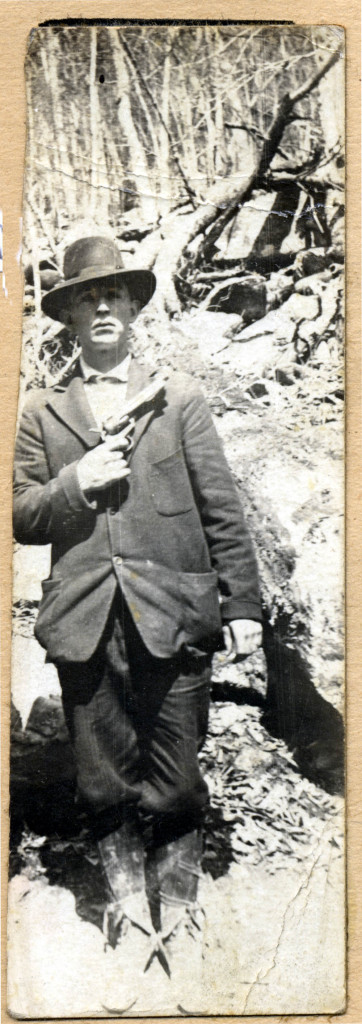
Young man standing, holding gun against his chest, and wearing hat and boots. FN Vl_35_1148
Everybody goes armed and shots are italicized words in their otherwise laconic conversation. The Robin Hoods of this greenwood do not wear the…
[3.004] 4.
…green doublet and tan boots of the operatic stage, neither liquid tenor voices nor waving mustaches; they wear jeans a slouch hat, cowhide shoes and one suspender fastened with a nail, but they have an eye that looks right through you, and their right-hand steals to their back pockets with a slow sure movement that is not to be misunderstood This is certainly and [strike] an interesting, and if one is not careful, a serious country.
Maria M’vay
Cincinnati Commercial Tribune, July 31, 1899, p. 4, col. 4-5.
[4.001-004]
SEARCH FOR BEAUTY.
Mountain Pilgrims Fail to Find Europas of Fiction.
Woman’s Numerous Duties.
Reasons for Lawlessness Among the Natives – Horseback Party Reaches Hazard, Ky.
Hazard, Perry County, Ky.
July 29, 1899.
[4.001] 1.
Where are the beautiful women of the Kentucky mountains? Where are the Mountain Europas of John Fox‘s vision? Where are those goddess-like creatures who ornament the pages of Charles Egbert Craddock‘s [ Mary Noailles Murfree (January 24, 1850 – July 31, 1922)] stories those tall, lithe maidens with strong, erect bodies modeled as nature intended them to be and unhampered with any of the confining and deforming clothes of civilization? Where are those Dianas of the forest those lovely unsophisticated creatures, with white skins, classical features, and shocks of tawny hair, who move shyly through the pages of mountain fiction and who fascinate with death-like grip the young civil engineer from the city who is spending a vacation carrying a surveyor’s chain through the trackless mazes of the mountains.
In two weeks’ travel through a country which has furnished much material to literature, I have only seen one woman who could put forward any claim to good looks and have it substantiated and she wore large bared-feet sure enough nines, and her clear complexion and cameo features were plentifully peppered with freckles.
No, so far as I have seen, this is not a country in which beautiful women dwell; they are for the most part, kindly, friendly, almost universally hospitable, even to the point of offering to lend you their tooth-brush and comb, but they are not good looking, and I think with some disappointment of all the mountain stories I have read in which the heroine was a rare beauty. There are many other countries, though, than those through which I have been, and maybe, it is better in Tennessee.
MOUNTAIN WOMEN’S WORK
I’ve been very much interested in seeing what the women do in these regions, and I find that they do almost everything. One woman, the family mother of a large family of children, arose in the morning, milked the cow, got breakfast, washed the dishes, and went out in the cornfield and hoed corn, came in and got dinner, spent the afternoon making stake and rider fence, came home and got supper and then started on a long walk to the pasture to bring home the cow. When she was asked what her men folks did, and why they didn’t go after the cow, she said, in a patient way: “The men folks mostly sit on the fence, chaw terbac’ and talk politics”.
I find, however, that there are two quite different mountain people. Native refinement, even without the education which ornaments it, and which is gradually getting to it, marks a great number of the mountaineers as our contemporary ancestors; they came originally from the east of these mountain, and either through hardship, illness, or inability were stopped here by this huge Virginia fence, while their hardier more courageous, and more adventurous friends and kinsmen pushed on to the level land, settled the Blue Grass country, and overflowed into the nearby States. The other class, no doubt, is descended from the inhabitants of the States which were then England’s colonies and to which she transported her criminals and convicts, her delinquents and defectives. The strong onward march of conquest and civilization from the Atlantic westward pushed the weak members to this wall where they stayed. This theory may account for the wild, lawless percent of the population, and also for the spirit which inspires some of the people to get to the “world outside” to get to school, to get into business, to get anywhere, anyhow into the big hustling places which they hear of dimly and die sometimes without seeing.
PRIMITIVE CONDITIONS OF LIVING
Some of the brightest minds of Kentucky came from the mountains ten, twelve, fifteen years ago; and it has been a matter of surprise to me that
[4.004] 3.
even in the benighted districts we have visited, we have met people who are cousins and sometimes nearer kin to well-known families in Lexington, Louisville, and other Kentucky cities. The mountains are full of good material as well as bad; they are a mine which needs only a means of communication with the outside world to dig out and weigh and value its worth.
The conditions of living in the mountains are so primitive as to occasion surprise even to one who is prepared for anything that may come The houses are furnished with a simplicity which is austere. There is usually no attempt at artificial decoration, except in the towns, where the people hear of the fashionable world, take a family paper and hand towels, knotted in the middle, over the corners of chromos. This touch of the parvenu riche spirit is very evident and is dispiriting after one has been in a real mountain cabin, where nice people live, who keep their plank floors clean, and whose furniture is plain, scarce, and handmade.
The loom is frequently seen on the porch, and so is the spinning wheel — not the pretty, little polished object which figures in the foreground of “Why-don’t-you-speak-for-yourself-John?” tableaux, but a big, plain article of manufacture, which looks like a cart wheel with a college education. The old-fashioned well-sweep, the handmade hickory chairs, baskets and other familiar New England relics are faithfully reproduced in the Kentucky mountains, among the better people, but, possibly at the next turn of the road you will see a log cabin of one room, with chinks so wide you can see within from the road, a miserable tottering stick-and-clay chimney, a mule tied to the rail fence, and a wild-eyed, thin-faced, half-dressed family of ten or twelve hanging on the uneven porch and watching the passerby with blank, listless curiosity. They live there — all of them, all together — and the oldest son, when he gets to be 19 or 20, will probably marry and bring his wife home to live under the paternal roof, which expression, in this case, is absolutely literal.
[4.004] 4.
There is a certain freshness and joy in living near to nature’s heart, which effect civilization does not offer. Life is simplified to a charming degree. The other day one of the ladies in the party was fatigued after a long ride and thought that her health demanded an egg-nog. She told me of her desire, and I volunteered to make it, if it were possible. I went to the nearest house with my tincup, to see what could be done. It was evening and the head of the family was just going out to milk. I went with her, held my tin cup under a mild-eed cow, watching alternately its peaceful expression and wicked tail until the cup was filled. I went back to the house, talked to the eldest daughter, who reached under the bed, brought out a sop box, shooed off the hen and captured a newly laid egg. There was an eloquent “little branch” leading up the mountain side which suggested another ingredient, and — a well. It was good egg-nog.
The party is now at Hazard, thirty-five miles from a railroad. The United States mail goes from here daily to Jackson, Breathitt County, in saddle bags, and is accompanied by a youth and a six-shooter. After this camp is struck, we intend to find and follow the Poor Fort [sic Fork] and to make for the Virginia line.
Maria M’Vey
Cincinnati Commercial August 3, 1899, p.5, col.5-8.
[5.001-003]
ON HOMEWARD WAY.
Berea Excursionists Reach Climax of Wilder Kentucky Trip.
Mountain Scenes Described.
Pine Mountain’s Long, Unbroken Ridge – Rough Road for Riders.
On Poor Fork, Harlan Co., KY.,
August 2, 1899
[5.001] 1.
The climax of the rough riders’ expedition has just been reached, and we are now homeward bound. Today we crossed Pine Mountain and descended into the Valley of the Cumberland, down which we will continue until we reach Pineville, and then return to Berea, from where we started. Crossing a mountain for the first time, at least, is an experience, and one well worth remembering. After a wild ride through Perry and Letcher Counties yesterday, we came into camp at evening at one of the most beautiful spots in the mountains. We had descended a steep road into a little hollow entirely encircled, and there we pitched our tents. Upright before us, as we looked to the east, rose a high endless wall fo soft varicolored green. It was Pine Mountain, 100 miles long, without a water gap, and it offered us only the courtesy of a slight depression in the skyline through which to gain the other side. This saddle in its summit is Hurricane Gap.
THE WALL OF THE WORLD
As the twilight deepened and the stars came out and the camp candles twinkled about like big fireflies, I sat and watched its soft, ascending greenness and its beautiful undulating line along the sky, and thought of how comparatively easy the ascent was going to be to us, and of how the green wall was literally the boundary of the world to many of the people who were born, who lived, married and died within its shadows; who never penetrated its forests and climbed its rugged sides to look beyond and saddest of all, who never cared to. To us, the mountain was merely an episode, a novel experience; to many of them it was the end of things.
Orders had been given for an earlier start than usual, and by six o’clock
[5.002] 2.
this morning we were on the way, the riders preceding the camp wagon, which were necessarily to come much more slowly. The ascent is two miles in length and consists of a series of steep zigzags over roads so rocky that the safest course to pursue is to shut your eyes, hold on and put your trust in your horse, who can pick the path much better than you are able to. the mountain is so densely wooded that in many places the sunlight never finds its deep recesses. Down in its winding “branches” and through its deep ravines there lies a purple light, and a hazy mist rests over all caressingly. Nothing could be more deliciously cool, fragrant, and far from the world of man than this rocky, moss-grown, fern-laden forest. The sense the band of hallooing angin horse who slowly around farther and farther up the harmony was no doubt complete. when the first Indian, or trapper, stole solitary into its depth at early morning, even his light foot fall startling the deer at the mountain brook who stopped and listened with head alert to know who the unwelcomed invader might be.
Mountain Views.
The ascent was so steep that frequent stops were made to allow the horses time for extra breath, and finally we reached the summit and emerged from the shady coolness of the wood to the fierce heat of the noonday sun. The view off to the right showed the long Kentucky chain through chain through whose valleys and over whose spurs we had been riding for two days: a succession of beautiful ridges, not great nor grand, nor gray and bleak as the Rockies are, but round and velvety and green, fading into the colors of the sky at the horizon line. We were then on the line which divides Letcher and Harlan Counties, and when the descent began, two miles of clinging to the ragged edge of nothing for a road, we suddenly looked up and saw Big Black Mountains compared to which Pine Mountain is almost a mole hill. Big Black Mountain is set in between the Cumberland range and what is called here the Kentucky range, and is the highest point for many miles. Between Pine Mountain …

0061b P. Roettinger Album. “Big Black” from near Poorfork [Poorfork, Ky].” [Bridge visible in foreground, buildings and mountains in background.]
[5.003] 3.
… and Big Black Mountain runs the Poor Fork of the Cumberland River, beside whose waters we are in camp tonight. In front of us tonight stands a sturdier sentinel even than our guard of last night; Big Black Mountain looks down on us with confident assurance, and quietly gets ready to turn from watching the starlit valleys of Kentucky to see the sun come across the Virginia hills.
Maria M’Vay.
Cincinnati Commercial August 7, 1899, p.4, col. 1.
GALLERY OF ORIGINAL TYPESCRIPT
- 1.001 mcvay_maria_1899_excur_1_001
- 1.002 mcvay_maria_1899_excur_1_002
- 1.003 mcvay_maria_1899_excur_1_003
- 1.004 mcvay_maria_1899_excur_1_004
- 1.005 mcvay_maria_1899_excur_1_005
- 2.001 mcvay_maria_1899_excur_2_001
- 2.002 mcvay_maria_1899_excur_2_002
- 2.003 mcvay_maria_1899_excur_2_003
- 2.004 mcvay_maria_1899_excur_2_004
- 3.001 mcvay_maria_1899_excur_3_001
- 3.002 mcvay_maria_1899_excur_3_002
- 3.003 mcvay_maria_1899_excur_3_003
- 3.004 mcvay_maria_1899_excur_3_004
- 4.001 mcvay_maria_1899_excur_4_001
- 4.002 mcvay_maria_1899_excur_4_002
- 4.003 mcvay_maria_1899_excur_4_003
- 4.004 mcvay_maria_1899_excur_4_004
- 5.001 mcvay_maria_1899_excur_5_001
- 5.002 mcvay_maria_1899_excur_5_002
- 5.003 mcvay_maria_1899_excur_5_003
RETURN TO:
SEE ALSO:
KATHERINE PETTIT Correspondence 1911
DANCING IN THE CABBAGE PATCH Moonshine
HENRY M. PENNIMAN Visitor – Biography

